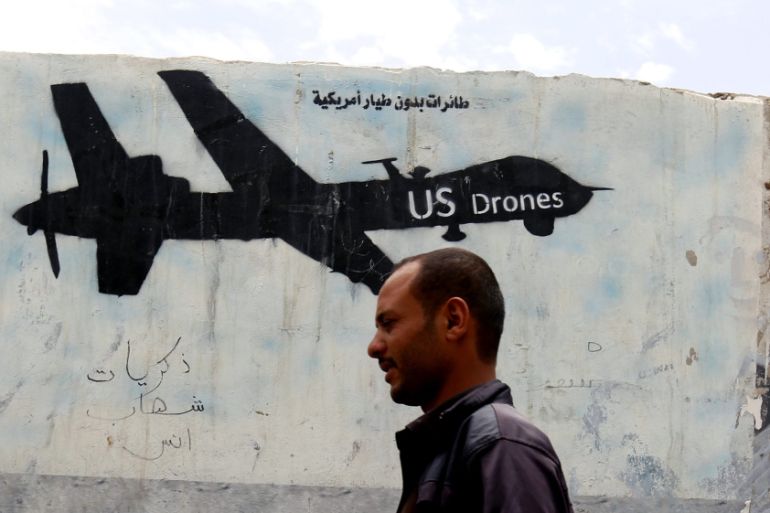Yemen Revolution: ‘Our dream was sold’
Yemen has had many conflicts but has also possessed exceptional survival skills.

This is the season for nostalgia for a time when we once stood together, different people with one cause, armed with nothing but our sheer numbers. If I close my eyes I can still see people clapping to the tune of ‘The people want an end to the regime’.
There are as many reasons as there are players that led us astray. Yet, the role of regional and international powers is often missing from the discussion. If you thought regional and international interventions began in March 2014, you haven’t been paying attention.
Keep reading
list of 4 itemsWhy Egypt backed South Africa’s genocide case against Israel in the ICJ
US sanctions two RSF commanders as fighting escalates in Sudan’s Darfur
Israel’s war on Gaza updates: 600k displaced from Gaza since May 6 – UN
Of course this does not mean that the sole problem lies outside Yemen. Yet the international community needs to stop pretending it does not have anything to do with how we got here, or how its policies helped exacerbate the situation.
ANALYSIS: What went wrong in Yemen?
Although this “election” was legal, it was hardly legitimate. Some groups including the Houthis and the Southern Movement boycotted the vote. A national unity government was then created, evenly divided between the formal opposition alliance – many of whom were part of Saleh’s inner circle – and the ruling party.
|
In Yemen, there is a side that is focused on winning battles, but there is also a side that is focused on winning life. |
The G10 countries informally assigned themselves the role of “facilitators of the GCC Initiative“. For example, the French were to lead work on constitutional reform, and the Americans on security and military restructuring.
Some Yemenis expressed concern that “external actors taking on these roles might bring their own particular preconceptions to bear”.
On paper, the UN-supervised National Dialogue Conference (NDC) was a good step, yet, the government appeared to be more concerned about winning the favours of the international actors than serving its own citizens. A week before the heavily financed NDC convened, I asked a woman in a village near the city of Hodeida: “What do you think of the National Dialogue?” I was met by a blank stare.
I proceeded to tell her about the NDC, and then asked her which priorities she hoped would be discussed. “Our stomach,” she replied. “We are hungry and we need jobs.” The perspectives of these ordinary Yemenis were not included in the process, and hence a new social contract for Yemen could not take place.
In addition, before the start of the NDC, the technical committee recommended the implementation of “20 points” that were meant to rebuild trust between groups that were previously in conflict with the government. Yet even after the end of the NDC, only a few of these points had been implemented.
!['We once stood together, different people with one cause, armed with nothing but our sheer numbers' [EPA/YAHYA ARHAB/EPA]](/wp-content/uploads/2016/01/d67a0cb13c8f47e2a7c0e155fa1a79dd_18.jpeg)
Owing to the insistence that the Yemen model was a success, NDC sponsors turned a blind eye to what was happening outside the conference halls.
After months of deliberations, Hadi extended his own tenure without an election and suddenly announced a federal system with six regions, with no consensus among NDC members or any decision in support of the move.
In July 2014, the government complied with the demands of the International Monetary Fund and lifted all fuel subsidies, increasing prices by between 60 and 90 percent overnight without notice and with no measures to ease the shock. Spontaneous protests erupted. Different groups, including the Houthis, capitalised on these grievances and recruited more members.
Houthi fighters extended their territorial control, and in September 2014 took over Sanaa after days of clashes. A new UN-sponsored agreement was not honoured, leading to a series of escalations that culminated in Hadi’s exile to Riyadh, the same city that once played host to Saleh.
Hadi, as well the international community, used the pretext of “legitimacy”, just as Saleh had used the pretext of “constitutional legitimacy” in 2011, to attack protesters.
Today, war is being waged on Yemen by the same countries that protected Saleh and gave him his last lifeline. The regional struggle between Saudi Arabia and Iran has also played out in the tussle for influence in Yemen. Given the complexity of countries and agendas involved, more conflict is likely to happen.
So, while parts of the country are ravaged by a civil war, the greater war is clearly not just between two Yemeni sides as the mainstream narrative suggests.
|
|
Q&A: ‘Yemen has gone 100 years back in time’
Today, Yemeni civilians bear the brunt of a vicious war, with 8,000 civilians killed, thousands displaced, and millions suffering from blockades. This in a country where wheat import dependency is about 95 percent. It is essentially a death sentence on an entire population.
Before the war, antidepressant pills were sold in great numbers. With no hope, no change in their employment status, no accountability, corruption on the rise, and a humanitarian disaster, many even took their own lives.
In 2012, the Ministry of Interior published a report citing a dramatic increase in suicide rates, especially among 18 to 35-year-olds. This has only increased with time. The war, of course, exacerbated this situation and led to Yemen becoming the world’s worst humanitarian crisis.
Nevertheless, despite this awful reality, my father, a man in his 80s who has experienced wars and imprisonment, still has hope.
In Yemen, there is a side that is focused on winning battles, but there is also a side that is focused on winning life. Yemen has had many conflicts throughout its history, but it has also possessed exceptional political and social survival and negotiation skills. If left alone, we would thrive.
The writer is a Yemeni researcher